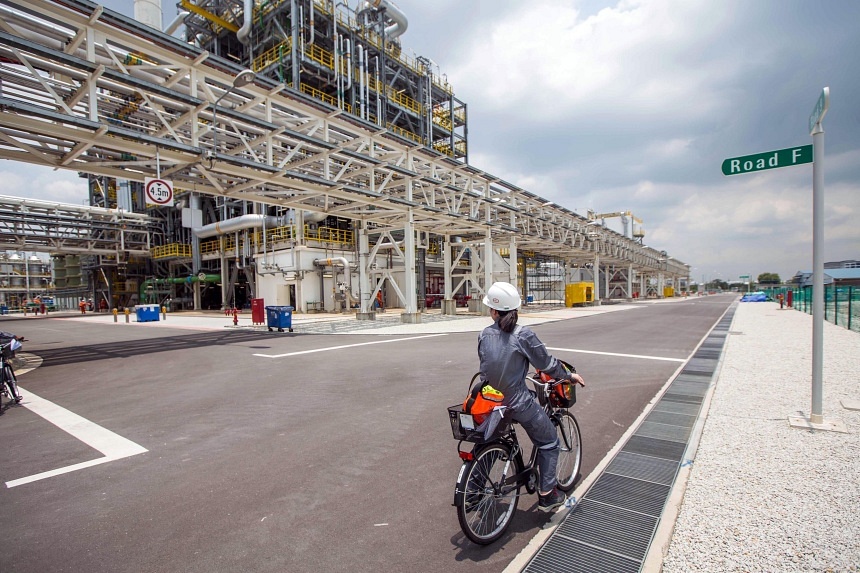SINGAPORE – German chemicals giant Evonik opened its expanded facility on Jurong Island on Aug 28.
The expansion will increase annual output by 40,000 tonnes, making the complex the largest methionine production facility in the world, with a market share of over 40 per cent. The chemical is used to feed farm animals.
The plant is now running at full capacity, after shutdowns in late 2023 and early 2024 for the expansion.
Minister-in-charge of Trade Relations Grace Fu said at the opening of the expanded plant: “Since its first sales office was set up here in 1969, Evonik has grown to be one of the largest players in Singapore’s energy and chemicals industry.”
She noted that the company has invested around $1.5 billion in Singapore over the years and now employs 700 or so staff.
Singapore is also home to the firm’s Asia-Pacific regional headquarters, its Asia research hub and five manufacturing plants that produce chemicals such as oil additives, catalysts and methionine.
The newly extended facility expands the plant’s total capacity by more than 13 per cent, Ms Fu added, noting that it also signals the start of the next bound of growth for Singapore’s energy and chemicals industry.
“From our days as an oil storage and distribution hub, we are now evolving to be an attractive global destination for speciality and sustainable chemicals,” added Ms Fu, who is also Minister for Sustainability and the Environment.
The expansion comes on the back of increasing demand for consumer and green products.
For one thing, Asia’s growing population has been driving increased meat consumption, which will in turn increase the demand for chemicals such as methionine, an important nutritional component of animal feed.
“At the same time, the demand for green chemicals is also rising, buoyed by government policies on the use of sustainable materials and consumer choices for sustainable products,” Ms Fu said.
“As these trends continue, we welcome partnerships with companies like Evonik to seize growth opportunities in the demand for speciality and sustainable chemicals, particularly in fast-growing end markets such as nutrition and agriculture, care chemicals, pharmaceuticals and mobility.”
Ms Fu added that Evonik can also help to support the transition of Jurong Island. In 2021, the Economic Development Board (EDB) released plans to transform the island into a sustainable energy and chemicals park that operates sustainably and exports sustainable products.
“Even as we seek to pivot the industry towards these growth areas, our chemicals companies must grow sustainably,” she said.
“By 2030, we aim to increase the output of sustainable products in the energy and chemicals sector by 1.5 times from 2019 levels, and achieve at least two million tonnes of carbon abatement per annum through low-carbon solutions.”
She noted that Evonik is also a proponent of sustainability. Its complex incorporates corrosion-resistant materials, and it could use seawater for cooling, significantly reducing the need of consuming fresh water in its processes.
The expanded facility also employs energy-efficient systems to further reduce its utilities and raw material consumption, including measures to reduce natural gas and electricity consumption.
It installed a 9MW alkaline electrolyser plant that is owned and operated by industry partner Linde, and it is in the process of getting this to be fully powered by green electrons.
Evonik’s deputy chairman of the executive board, Dr Harald Schwager, said: “Our collaboration with Linde on the implementation of green hydrogen in our Singapore facilities is a testament to our commitment to sustainability.”
Ms Fu said the measures will help to reduce the carbon footprint of Evonik’s additional production volume by 50 per cent, which might be the largest amount of carbon abatement achieved from a single site in the industry in recent years.
EDB executive vice-president Lim Wey-Len said that the plant expansion is a welcome push towards energy-efficient production that will reduce the plant’s overall carbon footprint while increasing competitiveness.
“This adds to a growing number of companies that are partnering Singapore on our decarbonisation efforts, which include carbon capture, utilisation and storage, bio-based chemicals production, low-carbon energy, and quality carbon credits,” he said.


